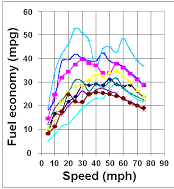
MPG Drop With Winter Diesel Fuel Change
 by Andy Published on Thursday, May 30th, 2013
by Andy Published on Thursday, May 30th, 2013
A few years back, our customers sought advice on poor fuel economy during winter months, particularly with diesel-powered vehicles. This phenomenon is easily explainable. The reason is that many fuel companies around the colder parts of the world, the UK being one of them, switch fuels during winter. This usually occurs in the UK around November.
This is necessary because it provides greater protection against gelling and waxing, typically providing additional protection of up to minus 15 degrees centigrade, as opposed to the standard minus 5 degrees during colder spells. The downside is that this fuel usually has a lower BTU (energy) value than the summer equivalent. This results in less energy being produced during the combustion process, and thus your engine requires more right foot to attain the same level of accelerative or cruising effort.
There isn’t an immediate solution other than to use a high-quality combustion modifier or fuel catalyst additive to help maximize the energy capability of the fuel. No additive can increase the BTU of fuel, but you can ensure you get the most out of it and ensure it’s not wasted in the form of excess emissions or particulates. Also, diesel engines are more susceptible to carbon build-up during winter months as the engine takes longer to get up to temperature, which can ultimately lower the MPG.
A diesel additive with combustion improvers can provide a much cleaner burn (even during engine warm-up conditions) with the added benefits of cleaning and lubricating the fuel system, preserving the fuel, and protecting against water and other contaminants.
If you have any questions regarding this article or require assistance, please don’t hesitate to contact us.






 categories
categories
Is there any data that reflects the affect contamination has on fuel efficiency (mpg); i.e. how do they (contaminants) reduce the miles-per-gallon obtained.
I am not aware of any test data. It also depends on the type of contamination.
Forgot to add, I live at/around 400m in SW France, but in the winter sun, even at -5°C, the door can be too hot to touch.
Archoil AR6350 or I would source a local anti wax / pour flow additive and see of that helps.
Thank you for the reply. I’d been looking at Amazon, but unfortunately, in the meantime, there’s been 4 inches of snow, so I won’t be venturing out for a while. It’s too windy and twisty, and up and down, with about half the amount of guard rails there are in Northumberland.
I’ve recently had a problem with waxing in a diesel engine, running below 0°C, but mainly in humid weather. -3 and dry, no problem.
I only managed 40 in 3rd struggling up a hill, trying to overtake an HGV.
Eventually the garage changed the fuel filter, but the experience of the engine dying slowly on a motorway left a lot to be desired. I thought diesel waxing was last seen in 78/79. Which product would you recommend?
Thanks for your help